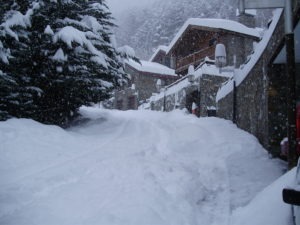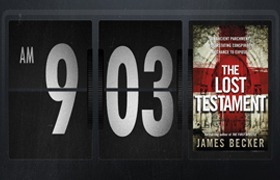Books
24 Hours with James Becker
Ever wondered what an author gets up to when they’re not on BBC Radio 4 talking about their new novel? We are endlessly curious here at Dead Good about the lives of our authors so we asked bestselling thriller writer James Becker to let us in on his working day!
Over to James:
‘These days, it’s a case of early to bed and early to rise, because of where we live and the time of year. Andorra is a tiny principality positioned high in eastern Pyrenees, probably best known to the outside world as a ski resort. We normally expect the first heavy falls of snow in December, but this year the white stuff has arrived earlier and in larger quantities than normal. Over one night last week we had a fall of about a metre, and the clouds have been doing their best to keep the level topped up ever since. A reasonable question at this point would be to ask why that would have any effect on anyone’s daily routine, and the answer is simple enough: Ted.
Ted is a Yorkshire terrier and my household – such as it is – more or less revolves around her. She is of course fully house trained, but this training stops some distance short of her actually using a lavatory, and consequently she makes use of the terrace on one side of the house. However, faced with a wall of cold white stuff some three feet high, she is understandably reluctant to advance any further, and in the absence of any better ideas is quite likely to ‘perform’ on the floor of the dining room or any other convenient horizontal surface. That’s why I’m up before her, and why you’ll find me outside the house wearing warm leather clothing, gloves and my genuine fake KGB fur hat, shovelling snow at seven in the morning.
It’s not perhaps the best start to a writing day, but on the other hand it does get me moving quickly. Just as an aside, local opinion is divided on whether or not so much snow so early means we’re in for a really bad winter, which would be good for the ski resorts, or a very mild one, which wouldn’t. We shall see, but already this year I’ve seen a couple of examples of Spaniards in the ditch.
This is another phenomenon which I’ve never really understood. The Spanish in particular seem to make a beeline to Andorra in the winter to enjoy the slopes and the cheap booze, and although they expect to find snow on the piste, for some reason it never occurs to them that there might also be snow on the roads. So they travel with undiminished velocity on high-speed tyres in two wheel drive cars, and with monotonous regularity find themselves upside down in a field somewhere, having gone straight on at the last bend. And on the rare occasions when they do decide that the conditions merit a degree of caution and a set of snow chains, they almost invariably choose to put them on the wheels with the car slewed halfway across the road and ideally on a blind corner. Forward-thinking does not appear to be a characteristic generally shared by Spanish skiers.

Anyway, with the terrace cleared, Ted relieved, and a drink in hand – green tea or coffee depending upon my state of alertness, or lack of it – I can then start work. My ‘office’ is the smallest bedroom in the house, and contains an old desk, a swivel chair which has definitely seen better days, a tall bookcase containing a number of reference books and other stuff, a small table handy for putting even more stuff on, and a music cabinet. I should perhaps add that I don’t have a musical bone in my body – the only thing I can play with any degree of ability is an iPod – and the cabinet simply holds paper and envelopes, an acts as a support for my laser printer. Other than that, there’s a leather reclining chair which I never sit on because it’s always covered in clothes or books or something else, and a wall-mounted cabinet containing the various music CDs I’ve acquired over the years, and which now I never play because everything is on the aforementioned iPod.
As far as the mechanics of writing are concerned, I always go back and re-read what I wrote the previous day or the previous week, depending on how much work I’ve actually done, to find out where I was in the story and where it should be going next. And then I start writing.
It’s been said that there wood writers and tree writers. A tree writer sees the whole story like a tree, and is able to visualise it from the start, at the very base of the trunk where it meets the ground all way to the end at the top of the highest branch, and can see absolutely everything before applying pen to paper or finger to keyboard. A wood writer, to continue the timber analogy, sees the book like a journey through a forest. He knows where he’s going to enter the woodland and where he will emerge, but the bit in the middle is largely a mystery to him until he actually gets in there.
I fall into the latter camp, to the occasional despair of my editor, because what I produce in my synopsis for a particular novel only very rarely bears much resemblance to the finished manuscript. I think this produces a book which develops as it goes along, with twists and turns which are as unexpected to me as they are to the reader. That’s my theory, anyway.
Another peculiarity about the way I work – or so I’ve been told – is that I tend to do my research on the fly. When I need to find information about a particular place or thing or event, I almost invariably leap onto the Internet and look it up there and then, rather than making a note to check it later and continuing to write. Other authors, I know, do all their research ahead of time, sometimes before they’ve even started writing the book, but because I usually have only the haziest of ideas about where the story is going, this is something I simply can’t do. And I find that researching as I write quite often throws up new ideas that I can incorporate into the manuscript as I go along.
I work directly onto my laptop, largely because I find my own handwriting almost entirely illegible, and I have never really seen the point of working in one medium and then transferring it to another, especially with all the tools and facilities which are available with a modern word-processing program. However, I do find that simply looking at the text on the screen of a computer is rarely enough, largely because what I’m seeing is what I expected to see rather than what’s actually there, so I also have a habit of reading the text aloud. That, I find, throws up errors more effectively than any other technique. If you read every word of a sentence aloud, missing words, clumsy expressions and unnecessary repetition become far more obvious.
On a practical note, I normally work from about eight in the morning until lunch time, and again in the afternoon, finishing about six, though the practicalities of life – shopping, seeing friends, walking the dog and everything else – obviously intrude, so it is very rare that I work for the whole day, unless a deadline is approaching with unexpected speed. We also spend quite a lot of time travelling, splitting our time between England, France and Andorra, as well as doing quite a lot of cruises every year – I get booked as a guest lecturer on a regular basis – so I do tend to spend at least a part of every day of the week working, just to ensure that I do meet deadlines.
I think that for any author reliability has to be one of their most important abilities, that and their willingness to accept editorial guidance. The publisher has to know that if the deadline is July, say, that the manuscript will actually be delivered that month. Douglas Adams famously said that he loved deadlines, and especially the whooshing noise they made as they flew past him. These days, with the uncertainty and turmoil that characterize the publishing industry, the one thing no commercial publisher can tolerate is deadlines that aren’t met.
That’s why I work every day. And talking of that, although at this precise moment I don’t have any deadlines looming, I do have a bunch of other stuff to be getting on with.
Deadlines are always a tricky thing to stick to. A big thank you to James Becker for taking the time out to tell us about his day!
Further Reading:


Please note: Moderation is enabled and may delay your comment being posted. There is no need to resubmit your comment. By posting a comment you are agreeing to the website Terms of Use.